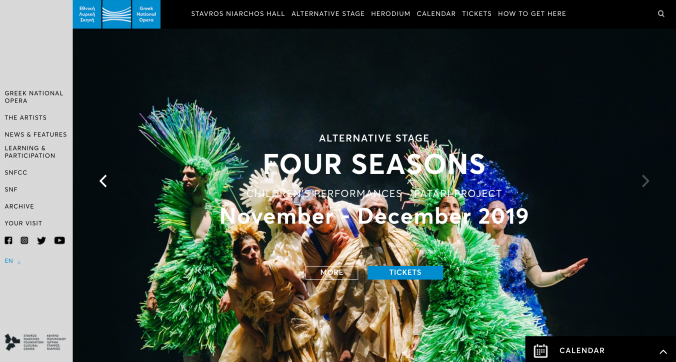The Greek National Opera (GNO) was founded in 1940, a few months before Italy declared war on Greece. The company had been preceded by a 150-year history of a flourishing opera tradition on the Ionian Islands and half a century of activity by the Hellenic Melodrama, an opera company which ran in various forms from 1888 to 1938. From the outset, the GNO repertory comprised operas, operettas and ballets. During the past decade, in response to current demands, the GNO has developed a Children’s Stage to develop future friends of opera. It also encourages modern works by commissioning new operas to contemporary composers. In this way the repertory of the GNO covers four centuries of opera from Monteverdi to contemporary Greek composers. The opera company operated initially as part of the National Theatre and gave performances in its historic neoclassical building on central Aghiou Constantinou Street, designed by the famous German architect Ernst Ziller.
In 1944 the company became a state-run corporation and was officially named Greek National Opera. Its first production in the old Olympia Theatre at Academias Street was Rhea, a significant opera by Greek composer Spyros Samaras. In 1946 the opera ensemble became an independent company, giving daily performances as of 1949 at the Metropolitan summer venue, and at the Kyveli Theatre during the rest of the season.
In 1950 the government released a bill providing for the foundation of a ballet school within the GNO. In 1958 the newly-built Olympia Theatre was inaugurated with Verdi’s Aida.
Between 1959 and 1964 the repertory grew apace, with at least twenty productions every season. A total of almost thirty operas were introduced to the Greek audience for the first time. The company generously supported works by Greek composers, and summer productions were staged at the Herodes Atticus Odeon as well as at the Ancient Theatre of Epidaurus starring Maria Callas, who many years before had made her professional debut as Maria Kalogeropoulou with the GNO. The company’s steady artistic development was interrupted by the military coup of 21 April 1967.
In 1974, when democracy was reinstated, the Hellenic Ministry of Culture assumed responsibility for the company. The notorious ‘certificate of political affiliation’, which had been necessary for all staff both administrative and artistic since the company’s foundation, was abolished and the organization of the company became more democratic generally, while its repertory was expanded. In the years that followed, some of the most distinguished personalities of Greek music have been at the helm of the GNO, expanding and improving the company’s activities, particularly by introducing new works and promoting the company internationally. Gradually the GNO developed its co-production policy, so that nowadays it co-produces operas with some of the world’s leading opera houses. Since 1994, the GNO has been a private, state-funded organization.
In March 2017, the Greek National Opera relocated at its new premises at the Stavros Niarchos Foundation Cultural Center, which constitutes a donation of the Stavros Niarchos Foundation to the Greek state. GNO's presents its artistic programme in its two venues at the SNFCC: the Stavros Niarchos Hall and the Alternative Stage. Every summer, the GNO presents summer productions at the open-air theater Odeon of Herodes Atticus.
